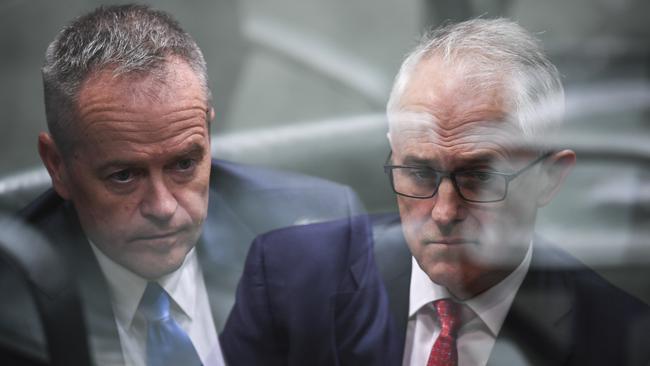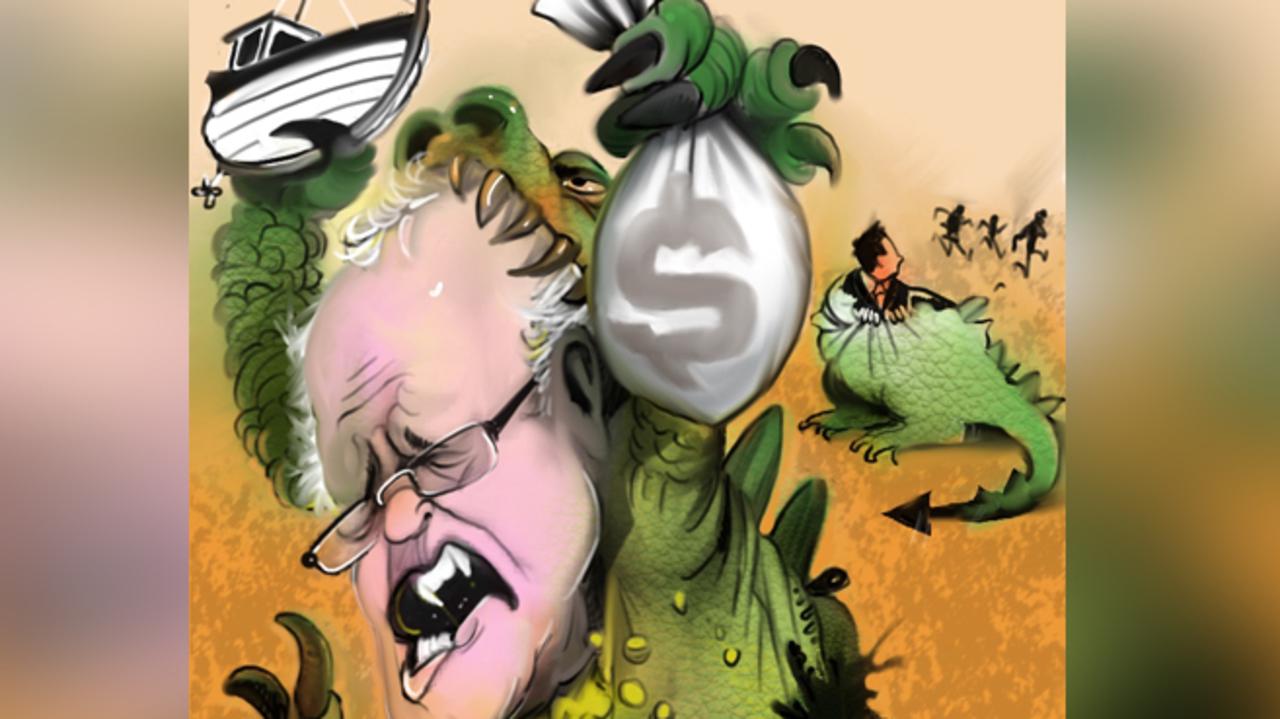Malcolm Turnbull fends off blows from left and right

In March last year at a Parliament House black-tie dinner celebrating 20 years since the election of the Howard government, a group of guests began interjecting during Malcolm Turnbull’s speech. It was so loud and so persistent that a female guest nearby walked over and told one particular woman and her companions to be quiet.
LIVE: Follow the latest developments from Canberra in our PoliticsNow blog.
According to witnesses there was a repeat performance at a tribute dinner for Bill Heffernan in July last year, when the Prime Minister rose to honour the retired senator. The same angry, unimpressed woman began interjecting.
Teena McQueen was accused of some of these interjections, but she denies it was her, claiming she was the one who told others to be quiet at the Howard dinner.
Almost a fortnight ago, thanks to a combination of complacency and rodent-like jiggery-pokery (think Kevin Rudd’s description of the Chinese), McQueen was elected a federal vice-president of the Liberal Party. Lacking the ticker and the numbers to knock off federal president Nick Greiner, Tony Abbott and his acolytes backed McQueen to unseat Trish Worth, a Liberal Party stalwart who had held the seat of Adelaide for 11 years, who knows a thing or two about campaigning and what it takes to make governments tick.
One of their arguments against Worth, who had made a few sensible comments on the importance of unity, was that she had disrespected MPs. It would be funny if it was not so perverse.
There were only four votes in it. Eric Abetz had called Worth when nominations opened to suss her out, complimenting her on her contribution and leaving the clear impression he and the Tasmanians supported her. Worth took it as a sign Abetz was mellowing. Wrong. Julie Bishop, who would have voted for Worth, had to leave the conference early. Delegates close to two young ultraconservative federal frontbenchers, Zed Seselja (ACT) and Michael Sukkar (Victoria), still simmering over same-sex marriage, voted against Worth, as did a West Australian woman using a proxy vote she had secured for another matter.
There was a widespread belief from the top down the votes for Worth were locked in. They clearly weren’t and if the political radar of the Prime Minister, his staff and supporters had been more finely tuned, they would have seen it coming. So a woman well-known for her antipathy to Turnbull, passionately devoted to Abbott, now sits on the federal executive.
Judging by the email she sent to delegates on Sunday night, in which she insists the ABC “must start paying its own way”, she is eager to play a big part in all federal and state election campaigns. Her victory embarrassed Turnbull and emboldened Abbott, particularly on energy, where he threatens to cross the floor if he doesn’t get what he wants.
Some have tried to equate this threat to Turnbull’s vote for Rudd’s carbon pollution reduction scheme. Let’s be clear. There is a world of difference between an opposition leader who had committed himself to a policy, lost his leadership because of it, then voted for it, and a former prime minister in a government with a one-seat majority threatening to vote against that government in parliament. Back then Turnbull gravely wounded only himself, whereas Abbott’s threat has the potential to bring down a government he has worked day and night to destroy.
The Canberra power plays, always brutal, always compelling, have intensified across the spectrum. They are factional, philosophical and deeply, deeply, personal, partly driven by blind hatred, partly by jealousy, partly by desperation, partly by rampant ambition. Lately it’s mainly because of the five by-elections on July 28 and the consequences that will flow from the results. Cue the Jaws theme.
The goal of the Turnbull haters inside the Liberal Party to destroy him, no matter the cost, will be that much harder if he manages the once-in-a-century feat of winning one of the seats. So they continue to do what they can to ensure he doesn’t.
In an effort to help them as he battles wildly to save his leadership, Bill Shorten went for the nuclear option, first by seeking to wipe out Pauline Hanson (which drove her into the government’s corner), then by going after Turnbull’s “wealf”, as he calls it.
Labor’s targeting of Turnbull over his millions is not new. What is new is the direct impugning of Turnbull’s motives to allege he is driving tax cuts for personal benefit. It would be slimy even if Turnbull didn’t donate his salary to charity and wasn’t well known for his philanthropy and generosity. It not only plays off the public distrust of all politicians, including Shorten in particular, it deepens it.
So although it is bound to turn off many voters, the Opposition Leader is banking enough of them will be convinced it is true.
Anthony Albanese is not the only Labor MP uncomfortable with Shorten’s approach, as Tasmanian backbencher Ross Hart so spectacularly showed. Others, particularly key members of the right, remain conspicuously, ominously silent, watching and waiting, biding their time.
Albanese couldn’t wait, jumping fully clothed out of the closet to get out ahead of any possible competition — Chris Bowen or Tanya Plibersek. Jiggery-pokery everywhere.
The pledge to repeal tax cuts for businesses with turnover of between $10 million and $50m, without final clearance from his shadow cabinet or the partyroom, is proof Shorten has decided it is now crash or crash through. Early signs are that he is crashing.
That pledge, combining poor policy with poor execution and poor timing, undercut all his talk about hitting the top end of town. An estimated 10,000 businesses, many of them family owned, employing more than a million people, would be affected. If mobilised, they would make a powerful army that would give Labor, the unions and GetUp! a run for their money.
As a result of his decisions in the past few days — green-lighting the personal assault on Turnbull and spontaneously, unilaterally announcing the company tax repeal — Shorten has guaranteed he will slip into the killing zone if he loses a single seat in the by-elections. Already nervous Labor MPs will take a few seconds to decide that the reasons he fell short in 2016 are the same reasons he could fall even shorter in 2019.
If he can’t hold all four Labor seats in by-elections against a government he has worked day and night to paint as disunited, dysfunctional, incompetent and uncaring, led by an arrogant, out-of-touch Prime Minister intent on lining his own pockets, what hope would they have in Shorten’s ability to win a general election, especially as he has had almost five years to show his political smarts more than make up for his lack of personal appeal.





